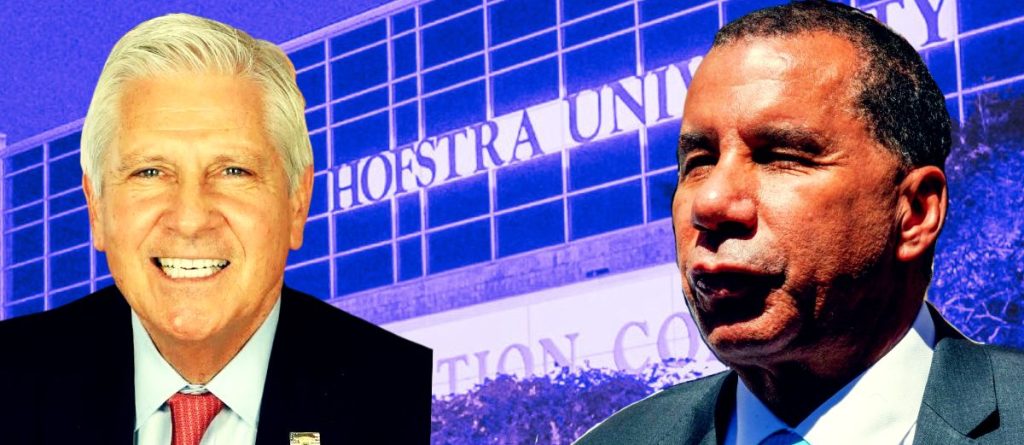The original article posted here

Just when you thought the drama surrounding a proposed Las Vegas Sands casino on Long Island could not get any more tense, we see series of events that occurred last week.
First, former Gov. David Paterson claimed that his alma mater Hofstra University – one of the biggest opponents for a Sands casino at Nassau Coliseum – discriminated against him and even blocked him from campus events because of his support for a casino. Paterson now works for Sands as a lobbyist.
Then, just days later, during a press conference, Nassau County Executive Bruce Blakeman backed up his claims of collusion by revealing screenshots of text messages that allegedly show Hofstra president Susan Poser wanting to help with the development of a Hard Rock casino in Queens.
The battle between Sands/Blakeman and Hofstra continues to wage on, nearing its one-year mark. But the heat continues to ramp up.
Paterson: Hofstra discriminated against him because of Sands affiliation
Start with Paterson, who along with Tracey Edwards, who also works for Sands, penned a letter outlining how Hofstra barred them from campus while also blocking nonprofits that received donations from the casino company.
“In recent conversations, we have been alerted that Hofstra University staff have stated that we are not allowed on the premises of Hofstra University without conditions because Sands employs us,” according to the letter, sent to the board of trustees chairman, as reported by the New York Post. “This is outrageous on many levels.
“It is a clear and open act of discrimination against one of your most distinguished alumni and the regional leader of the NAACP New York State Conference, an organization that fights for the equality and inclusion of all people.”
Paterson and Edwards called it “despicable” that Hofstra would seemingly prohibit nonprofits – members of which happen to be predominantly black – from using Hofstra facilities for events if they accepted sponsorship from Sands. The duo even described the university as “a school yard bully.”
“They were all black events,” Paterson, the state’s first black governor, told the New York Post. “They [Hofstra] crossed the line.”
Paterson claims come days after judge’s ruling against Sands
In response, a Hofstra spokesperson said that “any allegation of discrimination is mistaken.” The university considers Paterson “an esteemed alumnus” of Hofstra, which approved a congressional forum event with a panel featuring Paterson. Hofstra does not co-sponsor events with casino companies, the spokesperson noted.
Here’s a good time to remember the ruling issued by Supreme Court Justice Sarika Kapoor, who also happens to be a Hofstra graduate.
Kapoor, who had already struck down a 99-year lease agreement between Sands and Nassau County, ruled that a separate arrangement between Sands and the coliseum’s previous occupant was also invalid.
“It is noteworthy,” the Hofstra spokesperson said, “that these accusations from two Las Vegas Sands executives come three days after a NYS Supreme Court Justice granted Hofstra University’s motion for a declaratory judgment and affirmed that Las Vegas Sands has no leasehold interest in the Coliseum and the surrounding property, thus putting their casino development plans at risk.”
Blakeman doubles down on collusion allegations against Hofstra
Hofstra was back on the defensive again soon after, as Blakeman shared alleged text messages involving Poser. According to the Nassau County executive, the exchange showed that Poser and Hofstra were colluding to help New York Mets owner Steve Cohen land a lease for a proposed Hard Rock casino at Citi Field.
“The nickname for Hofstra is the Pride,” Blakeman, whose father and uncle both attended Hofstra, said during the press conference.
“There’s nothing to be proud about today in the administration of Hofstra University. In fact, it’s quite the opposite. It’s shameful. They completely misled and lied to the public. What a poor lesson for the students of Hofstra University.”
Blakeman, who originally accused Hofstra of collusion in January, asserted that a Las Vegas Sands casino would keep the area afloat, a sentiment shared by the Long Island Federation of Labor AFL-CIO. The latter, which agreed with Blakeman that Poser should resign, added that a Sands NY casino would deliver more jobs that would be much-needed around Nassau County.
Once again, in response, a Hofstra spokesperson called the text messages “informal reactions to press articles with Hofstra University’s consultant and confirm the lack of merit to the Legislature’s ‘investigation.’
“Hofstra University continues to believe that the public has a right to participate in decision making about redevelopment plans for the Nassau Hub. If Nassau County wished to embrace those principles, Nassau County would simply restart the process before the Planning Commission and the Legislature, as ordered by the Court.”
Say No to the Casino also issues defense for Hofstra
While Hofstra has been at the forefront of the fight against a Sands casino, the Say No to the Casino Civic Association has also staunchly opposed development.
After Blakeman’s allegations, Say No to the Casino issued a statement, emphasizing that “Mr. Blakeman needs to understand that he works for the people of Nassau County, not Las Vegas Sands.”
Calling Blakeman’s accusations “defamatory,” the association said that Nassau County’s “dirty fight” to earn a downstate casino license, which could clear the way to offer NY online casino gaming, “is unfairly targeting a prestigious academic institution that has sought to defend its student body and neighboring communities from the significant, pervasive, negative impacts that casinos bring.”
Say No to the Casino derided Blakeman’s accusations, labeling them as “nothing less than an attempt to manufacture more distractions from the fact that Hofstra’s win in the courts is putting LVS’ proposal in serious jeopardy.”
The group concluded that Sands and Nassau County officials should simply accept the court’s ruling to set an example that “laws are meant to be followed and will be enforced.”
